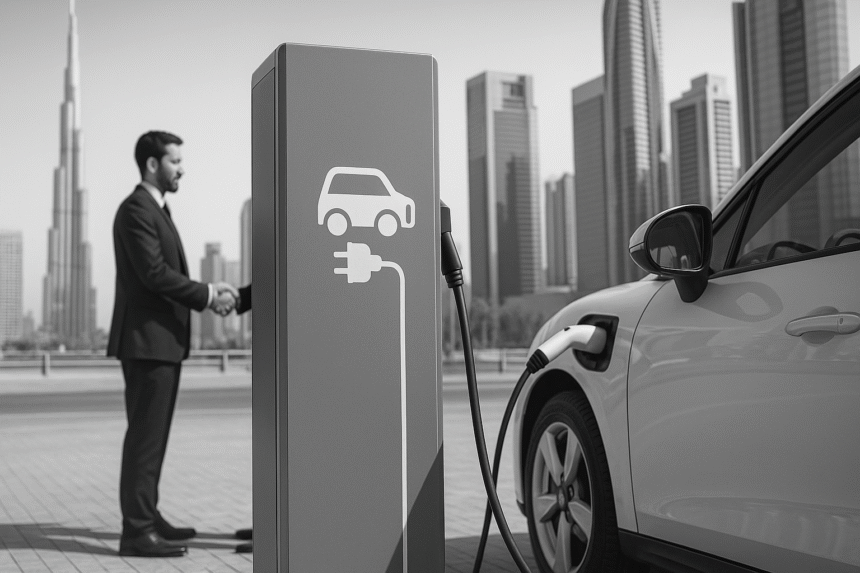How Public-Private Partnerships Are Shaping EV Charging in the UAE
In the UAE, electric vehicle (EV) adoption is accelerating—and with it, the need for widespread, reliable charging infrastructure. At the heart of this transformation lies a powerful model: public-private partnership (PPP). These collaborations between government entities and private companies are proving instrumental in driving EV charging initiatives across the country.
This article explores how public-private partnership EV charging UAE strategies are redefining infrastructure development, aligning national sustainability goals with private sector agility and innovation.
The Role of Public-Private Partnerships in UAE EV Plans
The UAE’s strategic sustainability agenda—exemplified by initiatives like the UAE Net Zero by 2050 and Dubai’s Clean Energy Strategy—places the transportation sector at center stage. Public-private partnerships have emerged as a key enabler in translating these goals into scalable EV infrastructure.
Government objectives supported by PPPs include:
-
Expanding the national EV charging network across all emirates.
-
Enhancing technical standards and safety compliance.
-
Encouraging innovation in mobility and energy.
PPPs allow the government to retain oversight while tapping into private sector efficiency, funding, and technology. This hybrid model reduces public financial burden while accelerating deployment timelines.
Government Incentives Encouraging Private Investment
The UAE government actively incentivizes private companies to join the EV ecosystem through:
-
Free zone benefits for clean energy firms.
-
Subsidized land leasing for installing charging stations in government buildings, malls, and transport hubs.
-
Regulatory fast-tracking for projects aligned with national energy goals.
-
Revenue-sharing models that allow private firms to recoup investment while contributing to public use infrastructure.
These incentives make the UAE one of the region’s most attractive markets for EV charger manufacturers, installers, and energy service providers.
Examples of PPP-Led EV Charging Projects
Here are recent high-impact projects showcasing how public-private partnership EV charging UAE frameworks are materializing:
1. DEWA + Private Sector Partners
Dubai Electricity and Water Authority (DEWA) has partnered with several private entities under its Green Charger Initiative, facilitating the rollout of hundreds of EV chargers across Dubai. These include both fast and ultra-fast chargers in strategic locations.
2. ADNOC Distribution
In Abu Dhabi, ADNOC Distribution has expanded its EV charging footprint through partnerships with private technology vendors. The goal is to create a seamless user experience through smart chargers integrated with digital payment and monitoring platforms.
3. Shabik and Landlord Agreements
Private companies like Shabik (acting as charge point operators) have entered into PPP-style agreements with municipalities and landlords to deploy and manage EV chargers across residential and commercial properties in Dubai.
These examples illustrate how PPPs are flexible and tailored—ranging from government-led projects with private execution to fully commercial installations under public regulation.
Legal and Contractual Frameworks Supporting PPPs
The UAE has developed specific legal and regulatory mechanisms to facilitate public-private partnerships, including:
-
The Federal PPP Law (Decree Law No. 12 of 2023) provides the backbone for risk-sharing and revenue models between public and private entities.
-
Sector-specific guidelines from DEWA, ADDC, and RTA outline technical, safety, and operational requirements for EV chargers.
-
Standardized licensing and permitting procedures, particularly in Dubai and Abu Dhabi, reduce friction for companies seeking entry into the EV charging market.
Clear legal frameworks ensure accountability, streamline compliance, and protect both parties—key for long-term viability.
Why CEOs and Infrastructure Providers Should Pay Attention
If you’re a CEO, investor, or infrastructure provider looking to enter the UAE EV charging market, PPPs offer a unique strategic advantage:
-
Reduced entry barriers through government support.
-
Access to prime real estate for station installation.
-
Brand visibility through alignment with sustainability goals.
-
Revenue growth in a high-demand, government-supported sector.
Final Takeaway: Collaborate for Growth
Public-private partnerships are not just funding tools—they are the engine behind the UAE’s EV infrastructure expansion. For private sector players, aligning your offering with national goals, securing the right licenses, and forging trusted relationships with government agencies are essential steps.
Now is the time to position your company as a strategic partner in this high-growth market.



Leave a Reply